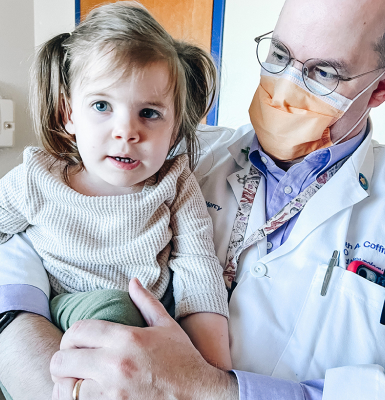Grant updates and related progress reports can be found after each individual grant where available.
Molecular Physiology and Pharmacology of ATP1A3 Mutations in AHC
During this funding period we continued to expand the bank of patient-derived induced pluripotent stem cell (iPSC) lines, and began using gene editing technologies to correct mutations in these cell lines. The purpose of correcting mutations was to create parallel cell lines with the same genetic background as the AHC lines, but without the disease-causing ATP1A3 mutation. We refer to these mutation-corrected iPSC lines as isogenic control lines. These cell lines were necessary enabled comparisons to be made with the original patient-derived lines without the potential confounding effects of different genetic backgrounds that occurs when comparing to cell lines from an unrelated person. Work in Dr. Ess laboratory at Vanderbilt succeeded in developing an isogenic control line from an E815K iPSC line, which they used to investigate basic properties of AHC neurons. This work was subsequently published in the journal Neurobiology of Disease.
During this funding period we also continued efforts to generate a mouse model of G947R and finally had some success. The first mice were born during this time and allowed us to establish an initial animal colony.
Molecular Physiology and Pharmacology of ATP1A3 Mutations in AHC
Our team published the first direct evidence of impaired ATP1A3 pump function in AHC in the journal Neurobiology of Disease. This discovery required the development of challenging measurement techniques applied to iPSC-derived neurons. Our findings represented an important technical advance for the field and demonstrated the fundamental molecular defect in the ATP1A3 protein function responsible for AHC. During this same period of funding, we also demonstrated that a unique ATP1A3 mutation disrupts gene splicing, resulting in half the normal amount of ATP1A3 protein in neurons. This was evidence supporting haploinsufficiency (e.g., half the normal number of functioning genes) as a potential genetic mechanism underlying AHC, which is distinct from the proposed dominant-negative effect of other AHC-causing mutations. Discriminating between these two genetic mechanisms would later prove important to deciding how best to design genetic therapeutic strategies.
During this funding period, we also continued efforts to generate a mouse model with mutation G947R and completed earlier studies on candidate pharmacological agents that were unfortunately not successful in identifying new therapeutic drugs. We did perform preliminary experiments designed to investigate the effects of flunarizine on AHC neurons.
Molecular Physiology and Pharmacology of ATP1A3 Mutations in AHC
The collaborative team of Dr. George (Northwestern) and Dr. Ess (Vanderbilt) continued to expand the bank of patient-derived induced pluripotent stem cell (iPSC) lines. The bank of cell lines was intended for use in generating neurons that carry specific AHC causing mutations. Among the lines was one with a unique mutation that interrupted gene splicing, and this offered an opportunity to learn more about fundamental ways ATP1A3 can be damaged in AHC. We also devoted considerable effort to optimizing methods to record electrical activity of ATP1A3 protein in neurons made from iPSC lines. These ground-breaking methods led to the first direct evidence of ATP1A3 pump dysfunction in AHC. We also made the first attempts to generate a mouse with mutation G947R. Future attempts would ultimately be successful.
Molecular Physiology and Pharmacology of ATP1A3 Mutations in AHC
The Alternating Hemiplegia of Childhood foundation is pleased to announce an award of $250,000 presented to Dr Kevin Ess at Vanderbilt University Medical Center and Dr Alfred George Jr. at Northwestern University to continue their work on the project, “Molecular Physiology and Pharmacology of ATP1A3 mutations in AHC”. (phase 5) The project will build upon their previous work studying the functional impact of the three most common mutations in the ATP1A3 gene. This will include testing the ability of several compounds identified through computer modeling to restore pump function. They will also use human stem cells that were differentiated into neurons to study electrophysiological dysfunction as well as the possible reversal of these abnormalities by treatment with candidate compounds. Finally they propose to use cutting edge genetic engineering techniques to either introduce or correct ATP1A3 mutations in human neurons. This will also include rigorous testing of the most common ATP1A3 mutations on neuronal physiology.
Molecular Physiology and Pharmacology of ATP1A3 Mutations in AHC
$250,000 awarded to Dr. Kevin C. Ess at Vanderbilt University and Dr. Alfred George, Jr. at Northwestern University to continue their work to determine functional and biochemical consequences of the three most common gene mutations causing AHC. They have made induced pluripotent stem cells (iPSCs) derived from AHC patients. These cells will be differentiated to subclasses of neurons and tested for functional deficits. They will also be using a cell and computer -based screening process to identify drugs or drug-like compounds that are capable of restoring normal ATP1A3 gene function. Finally, they will investigate novel animal models of AHC to elucidate mechanisms of the disease and to test therapeutic strategies. This grant was a collaborative effort between the AHCF and the Alternating Hemiplegia of Childhood Ireland.
Progress Report:
Molecular Physiology and Pharmacology of ATP1A3 Mutations in AHC
$281,614.00 was awarded to Dr. Kevin Ess at Vanderbilt University and Dr. Alfred George, Jr. at Northwestern University to continue their work to determine functional and biochemical consequences of the three most common gene mutations causing AHC. They will also continue to identify drugs or drug-like compounds through a drug screening program that are capable of restoring normal ATP1A3 gene function. Finally, they have made induced pluripotent stem cells (iPSCs) derived from AHC patients. These again include the three most common gene mutations causing AHC. These patient-derived stem cells will be used to investigate electrophysiological abnormalities of neurons and to test whether compounds they have identified can restore ATP1A3 function.
“We are extremely honored to continue our work with the Foundation and its membership. This is a very exciting phase of discovery for everyone connected to AHC and is critical to expand our knowledge of ATP1A3 function and to seek new treatment strategies. The very generous donation by the AHCF will enable us to determine mechanisms used by specific ATP1A3 mutations that cause AHC. We will continue our success from last year by identifying novel potential drug therapies that can correct the defect caused by specific ATP1A3 mutations. Notably, we are using human cell lines including induced pluripotent stem cells (iPSCs) that harbor ATP1A3 mutations. Our experiential approach was designed to most quickly identify disease pathways as well as potential therapeutics that can help those afflicted with AHC.”
Progress Report:
Research Grant awarded to Radboud University Nijmegen the Netherlands JanKoenderink
$13,500.00 was awarded to Dr. Jan B Koenderink, Radboud University Nijmegen Medical Centre, The Netherlands. His group studied the molecular consequences of at least six different ATP1A3 mutations in functional in vitro assays. Eventually, the relationship between these mutations and AHC will be evaluated. This grant was a collaborative effort between the AHCF and the AHC Association of Iceland.
Progress Report:
Research Grant awarded to Vanderbilt University “Molecular Physiology and Pharmacology of ATP1A3 Mutations in AHC”
$169,154 grant awarded to Dr. Alfred George, Jr. and Dr. Kevin Ess at Vanderbilt University to determine the functional and biochemical consequences of the three most common gene mutations causing AHC, to identify drugs or drug-like compounds capable of restoring normal gene function, and to investigate the electrophysiological properties of human neurons generated from induced pluripotent stem cells derived from AHC patients. AlGeorgeQuote from Dr. George: “We are honored to work with the Foundation and its membership to help understand the basis for AHC and to seek new treatment strategies. This generous donation will enable us to determine how ATP1A3 mutations cause AHC and find pharmacological strategies to correct the defect. While animal research is always very important, this work will use human neurons generated from patients with AHC.”
Progress Reports:
Grants awarded to Vanderbilt and University of Utah: Molecular Physiology and Pharmacology of ATP1A3 Mutations in AHC
$94,535 grant awarded to Dr. Alfred George, Jr. and Dr. Kevin Ess at Vanderbilt University to investigate the functional consequences of AHC gene mutations to identify drugs or drug-like compounds with potential therapeutic effects in restoring normal gene function, and to develop advanced human cell models of AHC based on state-of-the-art induced pluripotent stem cell technologies.
Progress Report:
Click here to review the final report from this grant. (PDF format)
Novel Genetic Causes for AHC in Familial or Sporadic cases or both KathySwoboda$51,625 grant awarded to the Pediatric Motors Disorders Research Program at the University of Utah, Dr. Kathryn Swoboda, Principal Investigator, to identify the additional causative gene(s) in patients without mutations in ATP1A3.
Grant awarded to the University of Utah: Clinical and Genetics Studies in AHC and Genotype/Phenotype Correlations and Online AHC database
$175,000.00 grant awarded to Dr. Swoboda – Part I: Clinical and Genetics Studies in AHC and Genotype/Phenotype Correlations, Part II: Online AHC database: Natural history and Functional Outcomes. Principal Investigator, Dr. Kathryn Swoboda; Key Personnel: Research Associate, Kelley Murphy; Project Manager, Dr. Sandra Reyna
Progress Report:
Grant to Dr. Reyna SandraReyna$25,000.00, Grant awarded to Dr Reyna to provide certain consultation, supervisory and advisory services in connection with the clinical drug trials through 12/31/2011.
Pepsi Grant $250,000.00 Pepsi Grant, To Identify the gene or genes causative for Alternating Hemiplegia of Childhood (AHC) as the critical step in understanding pathogenesis, In collaboration with the Institute of Systems Biology and complete Genomics, Dr. Kathryn Swoboda Primary Investigator.
Chase Grant $20,000.00, Chase Grant, Allocated to Dr. Sandra Reyna to provide certain consultation, supervisory and advisory services in connection with the clinical drug trials sponsored by AHCF – $5000.00 additional monies provided by AHCF.
Clinical Drug Trials: $25,118.00 The Foundation funded the Single-center Phase I/II Trial of Sodium Oxybate in Patients with Alternating Hemiplegia of Childhood. Dr. Aga Lewelt, Primary Investigator.
Grant to Dr. Swoboda Three-year grant was awarded to continue ongoing efforts to identify the genetic mechanisms involved in disease pathogenesis, development of a fellowship program designed to attract new and talented young physicians to AHC research, and proposed a pilot clinical trial. Dr Kathryn Swoboda, Primary Investigator 7/1/2009 – 6/30/2010 – $134,873.50 7/1/2008 – 6/30/2009 – $211,473.02 7/1/2007 – 6/30/2008 – $203,339.45
Grant to Dr. Magleby JoshMagleby$3100.00, Cognitive, and Behavior Research Study. Dr. Josh Magleby Ph.D. Primary Investigator.
Grant to Dr. Swoboda $66,890.00 each year, for three years ($200,670.00 total), University of Utah, Neurogenics Laboratory, to identify the genetic cause of Alternating Hemiplegia of Childhood, Dr. Kathryn Swoboda, Primary Investigator.
Grant to Drs. Van Brederode and Rho $37,485.00, Effects of Flunarizine on Neocortical GABAergic Glutamatergic function. Dr. Van Brederode and Dr. Rho are, Primary Investigators. 1999 – 2000 Grant to Dr. Ptacek $40,000.00, Research for Molecular understanding of AHC. Dr. Ptacek, Primary Investigator transition from Dr. Ptacek to Dr. Kathryn Swoboda 1997 – Research Symposium/Workshop, May 1997 in Seattle, WA – sponsored by AHCF 1996 – 1997 PET Grant $20,000.00 from AHF & $10,000.00 from IFAHC to study AHC patients using Positron Emission Tomography. Dr. Chugani, Primary Investigator. 1995 Grant to Dr. Chugani $19,000.00 to evaluate treatment approaches in AHC, and investigate underlying causes of the disorder, Dr. Chugani, Primary Investigator.




